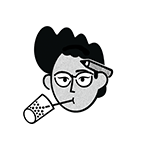On Earth We’re Briefly Polite
A white room.
A pillar stood. Attached to it, a humming projector.
Lights illuminated. Dust swirled.
On the screen, a guest speaker from here or the US, I couldn’t recall.
A white room? Or the faces projected above, behind the podium?
“My recent favourite, Ocean Vuong’s memoir. I highly recommend if you haven’t read it,” said the projected face, his voice chirpy, American-accented—now, I remember.
“It was the most beautiful autoethnography about the author’s journey from Vietnam to the States. It’s written as a letter to his mother, but guess what’s crazy? His mother can’t read his book!”
Wide-eyed—blue, green, purple—the speaker exaggerated his expression, nosed closer to his webcam until all we could see was his pale complexion and grey stubble. He explained, and some more, as though this was a revelation we should all be cooing over, as though this was a far-off experience unimaginable.
“Give him the benefit of a doubt,” you say. “He couldn’t see all your yellow faces on his laptop.”
“Right.” I nod. “After all, the most common criticism I saw from tourists travelling East Asia was how no one spoke English at the restaurants.”
Ocean Vuong’s mother can’t read that letter because English wasn’t part of her curriculum while she made ends meet by washing hair at a Saigon salon. English, to the dominant monolinguals, is a given, an assumption, like the default you expect to find in the smaller print on a foreign menu.
“Now, now, you’re being too critical,” you say. “What’s wrong catering to tourists?”
“Right.” I nod. “After all, I came here to study, to write and publish theses my mum and dad can’t read.”
For English, I moved countries at fifteen. The language, they said, I needed to master if I wanted to be somebody. The language that would later take me five of the same proficiency exams to prove enough credentials to enter a Canadian institution, then to sit in this white classroom in Edinburgh.
“Well, aren’t you glad you’re bilingual?” you say. “Accessing double the resources, expanding your vocabulary as a writer? That’s a good thing, no?”
“Right.” I nod. “After all, I wouldn’t be here, there, everywhere if it weren’t for my privileged background, my parents’ financial backup.”
I would spare you the details of how I’m quad-lingual, speaking the Taiwanese dialect with my grandmother—a giveaway daughter whose only education was labour—learning Japanese because that’s what my partner blurts out when he feels the most fragile. I’d spare you the details, in case you go wide-eyed at how exotic it sounds.
I would not point out, in the white classroom, my German friend whose mother also uses Google Translate to understand her poem.
I would nod, not because I agree, but it’s the polite thing, where I come from, to accommodate those who think they have the world figured out.

yating (she/they) decapped their name to protest its translation from Taiwanese. Mandarin characters sucked out of meaning—just the phonetics, another exotic name, another yellow face. Their pronouns echo similar sentiments. 100 years ago, Mandarin didn’t distinguish between “she” and “he” until the Bible demanded translation. Writing in English, their third language, yating code-switches and somehow convinced Fahmidan Journal and Quarter Press.

 BACK TO ISSUE
BACK TO ISSUE